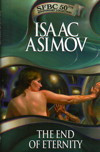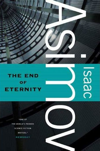Due to circumstances within our control…tomorrow will be canceled
In the fantastic world of The End of Eternity this terrifying forecast was certainly possible. The Eternals, the ruling class of the Future, had the power of life and death not only over every human being but over the very centuries into which they were born. Past, Present, and Future could be created or destroyed at will.
You had to be special to be come an Eternal. Andrew Harlan was special. Until he committed the one unforgivable sin—falling in love.
Eternals weren’t supposed to have feelings. But Andrew Harlan could not deny the sensations that were struggling within him. Andrew knew he could not keeep this secret forever. And so he began his escape…a plan that changed his own past…and threatened Eternity itself.
This is certainly an odd-ball. It’s a time-travel novel (Asimov rarely wrote time-travel stories), and it doesn’t fit into the general Foundation/robot future history (although both this book and one of the Foundation books makes the connection), so I think it tends to be relatively neglected among Asimov’s opera. This is a shame, because it is one of his best novels, perhaps the best after The Caves of Steel.
Without a doubt, Asimov’s conception of time-travel is the most interesting aspect of the novel. I'm not a big fan of time-travel stories, so I cannot say for certain, but the concept of a group of people manipulating history from the outside is unique in my own experience and absolutely fascinating. The story told against this background is also a lot of fun and has a patented twist at the end.
The characters are, some of them, moderately interesting. Harlan, the hero, seems vaguely dull, and Twissell verges on being a Hari Seldon clone in spots. The more interesting characters are the more minor ones, particularly Cooper and the woman-with-the-unpronouncable-name, Noÿs Lambent. It’s a shame that she has so little to do in the story, and that what she does is largely confined to standing around and being seductive. She deserves rather better.
One personal story about this book. When I first read it, I was not quite in my teens and not terribly sophisticated in the ways of the world. Asimov uses the discrete term “making love” to refer to certain physical acts involving Harlan and Noÿs, and I assumed he meant a bunch of hugging and kissing kinds of stuff. (I think he also refers to their “sleeping together,” which I assumed meant that they, well, were asleep.) I once had a rather lengthy argument in the eight grade with a friend of mine, who insisted that Asimov was referring to the two having sex, and I insisted that my friend was off her rocker.
One other note: The original novelette on which the novel is based is found in The Alternate Asimovs (as is the original version of Pebble in the Sky and the story “Belief”). As with Pebble in the Sky, it is interesting to compare the two versions—and as with Pebble, the novel is a vast improvement.
The complete text of this novel is included in Other Worlds of Isaac Asimov.



